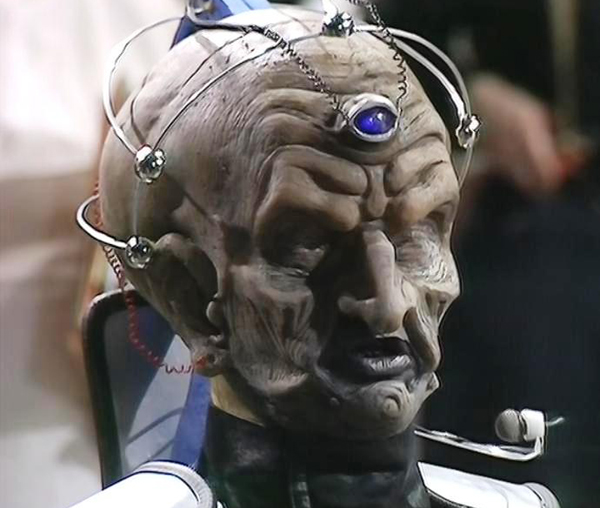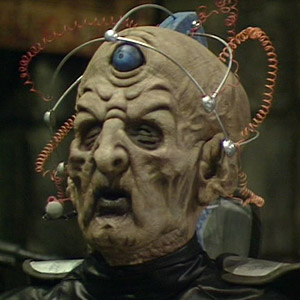RTD gave us a tardis that has golden CGI magic that makes daleks disappear in Series 1.
RTD gave us werewolves, and drawings that come to life in Series 2.
RTD gave us Witches, the power of feelings making the doctor deage 1000 years and start flying, and the Doctors screw driver can scan people's intelligence and personality, in Series 3.
RTD gave us pure timelord magic in Series 4 (whatever the meta crisis was supposed to be).
RTD gave us people surrounded by glowing golden magic they can just summon from pure will power and get rid of with pure will power (Star Beast).
RTD will give us goblins.
Can he just make a reboot of buffy? He clearly just wants to do fantasy shows where he can just use magic to end plots that are really just set dressing for le ebic drama moment. He doesnt care about cause and effect or even trying to write anything smart. If he wants to have a magic wand open wooden dead bolt privacy doors (The Next Doctor) or to be able to tell the user the personality and intelligence of the person it is pointed towards (Runaway bride). If he wnats to write stories with Goblins, Werewolves, Witches, and golden magic that makes all the enemies disappear (Series 1 ending) then he can do that IN ANOTHER SHOW.
Sorry I disagree to some extent.
To start with Iank is right. No way could RTD do a show as good as Buffy. Even his first era was kind of Adele to Buffy's Amy Winehouse, the twee, upper middle class, safe version of something that was original, but that the upper middle class types might have trouble promoting because it's a bit too different.
Furthermore ironically I think DW can and should every now and again dip its toe into fantasy. It does have a fantastical aspect to it with the TARDIS being very much a wardrobe to Narnia type plot device and Hartnell's Doctor, by the actors own admission crossing a fine line between Wizard and old scientist. That's the thing about sci fi and fantasy, is that they are basically the same genres in the sense of being the imaginative genres, but obviously they do have a different perspective which you have to understand to get them both right. Still the similarities do lead to them using a lot of the same tropes and a really skilled writer or actor for that matter can mix them up, or even just blur the lines between them through these tropes. The mad wild haired wizard like Merlin in fantasy stories who knows everything and is always tinkering away in his lab is no different to the mad wild haired scientist who knows everything and is always tinkering away in his lab and again Hartnell is both as whilst he is clearly a scientist, the mysterious nature of his origins, and the surrealist aspect of the TARDIS itself leave it open ended.
Also CS Lewis was just as big an influence on the Hartnell era stories as HG Wells. The Magician's Nephew sets the template for the first three Hartnell stories in a lot of ways, with Uncle Andrew being a proto Hartnell and Jadis being a proto Dalek too.
On top of all that many classic who stories, from Kinda, to State of Decay, to Mind Robber as well as the Great Intelligence itself are all fantastical. The entire McCoy era from Silver Nemesis on meanwhile is a space fantasy show. It baffles me how fans and retrospectives never pick up on that? It's as big a part of McCoy as gothic horror is for Hinchcliff or humor is for Williams! Every single story from Silver Nemesis onwards features a supernatural or fantasy element.
Silver Nemesis, Lady Penforte, a Witch.
Greatest Show in The Galaxy, Gods of Ragnarok, Werewolf.
Battlefield, witches and demons.
Ghost Light, haunted house and an angelic being.
Curse of Fenric, Vampires and Fenric, a Demon.
Survival, a planet possessing someone like a Demon, and humans transforming into animals, and the planet playing on the dark urges within someone.
I might add as well that a lot of these creatures are not given the standard "it was just aliens that we mistook for supernatural beings" approach, or Clarkes law of any advanced form of science is indistinguishable from magic to primitives.
The great vampires, werewolves, gods, Fenric, Mara, even the Intelligence's origins are all left open ended, whilst in Battlefied, they truly blur the line between fantasy and sci fi. In Battlefield the Doctor tells Ace that Clarke's law can be reversed and that magic and science are just relative terms and he is right. The witch in that story comes from a universe with different natural laws to our own, and is able to draw on the alien energy from her universe, to rewrite the laws of ours as she sees fit. Similarly the Demon comes from another universe, one where the natural laws are different and from our perspective it is a hellish place. On the one hand we can still group both the witch and the demon into scientific categories as aliens from other universes, on the other however they are both supernatural in that they go beyond the natural laws of our universe. This isn't the same as Clarke's law where the "magic" still works within the laws of our universe, it's just that we don't understand how.
Again you can see how in that respect terms like magic and science become somewhat obsolete, and indeed in this respect the McCoy era was years ahead of its time, as Buffy would take arguably the same approach to its supernatural creatures, who similarly can technically be classed as aliens as they come from different worlds in different realities, with different laws, but are also by that definition supernatural too.
The revival meanwhile in contrast not only hasn't featured as many supernatural creatures, but it has also I feel gone for the standard ancient astronauts, Nigel Kneale (god is he overrated) approach of just having it that supernatural creatures were inspired by aliens.
His Werewolf, unlike Mags for instance is 100 percent an alien, with a sci fi explanation about why it changes on the full moon. The witches are aliens, with the Doctor saying magic doesn't exist definitively to lovely Freema. Their vampires meanwhile in Matt's time were honestly the least supernatural of all three takes on vampirism (even the Haemovores were created by an ancient Demon, these guys are just fish aliens.) Really only the beast two parter takes the classic who approach of leaving it open ended and is honestly one of the best New Who stories ever made as a result.
I think people only assume that RTD is more of a fantasy writer because his sci fi resolutions can be extremely lazy like in Parting of the Ways. Lazy sci fi can look like fantasy at times, but ultimately Parting of the Ways resolution wouldn't even work in a fantasy environment as there has to be some kind of logic to it. (Which there isn't in Parting of the Ways. How the f*ck can an old obsolete piece of time lord technology, like a type 40 TARDIS be powerful enough to wipe out the Daleks who destroyed the Time Lords?)
To be fair though Buffy often had shit resolutions for its finales in terms of logic like in the Gift and the season 7 finale so in that respect Russell kept it alive LOL.



